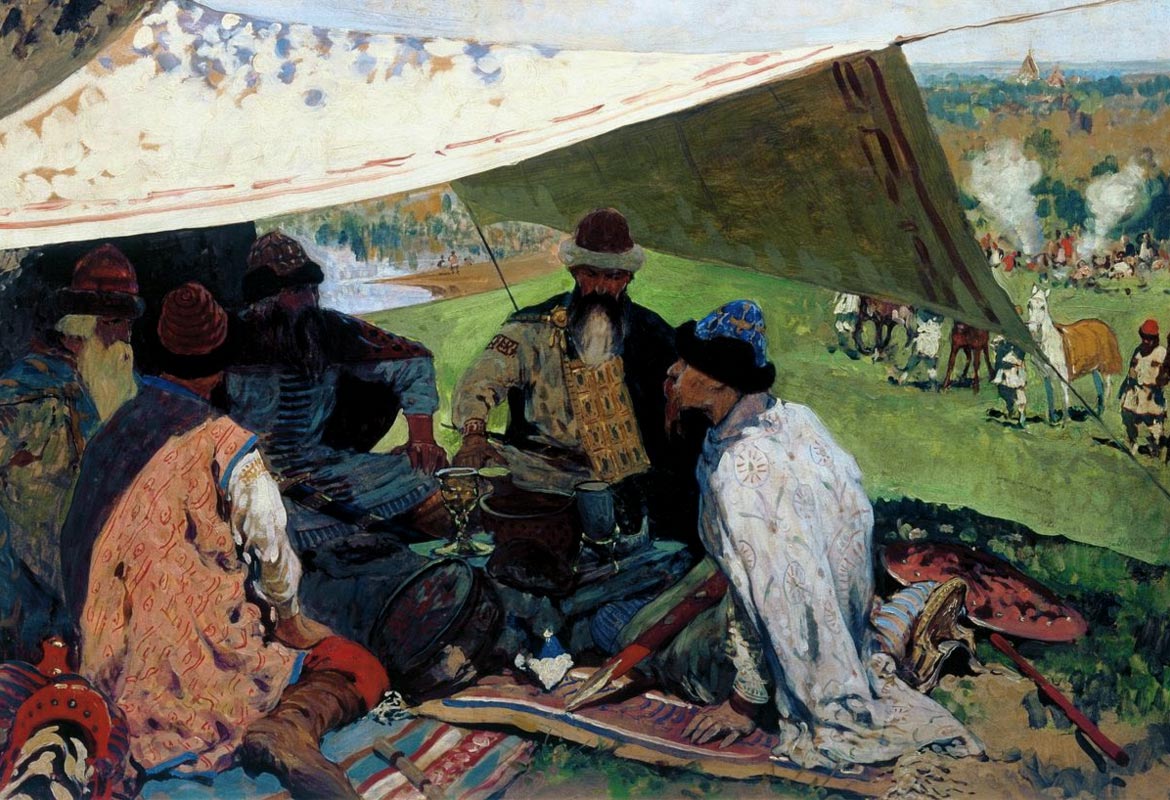Battle Of The Stugna River on:
[Wikipedia]
[Google]
[Amazon]
The Battle of the Stuhna River (sometimes written as Stugna River; 26 May 1093) was fought between the princes of

Svyatopolk biography
Includes description of events. {{coord missing, Ukraine Stugna River 1093 Conflicts in 1093 1093 in Europe Stugna 11th century in Kievan Rus'
Kievan Rus'
Kievan Rusʹ, also known as Kyivan Rusʹ ( orv, , Rusĭ, or , , ; Old Norse: ''Garðaríki''), was a state in Eastern and Northern Europe from the late 9th to the mid-13th century.John Channon & Robert Hudson, ''Penguin Historical Atlas of ...
, Sviatopolk II of Kiev
Sviatopolk II Iziaslavich ( orv, Свѧтополкъ Изѧславичь; rus, Святополк Изяславич, Svyatopolk Izyaslavich; uk, Святополк Ізяславич; November 8, 1050 – April 16, 1113) was supreme ruler of ...
, Vladimir II Monomakh
Vladimir II Monomakh (Old East Slavic: Володимѣръ Мономахъ, ''Volodiměrŭ Monomakhŭ''; uk, Володимир Мономах, translit=Volodymyr Monomakh; russian: Владимир Мономах; Christian name: ''Vasiliy'' ...
of Chernigov
Chernihiv ( uk, Черні́гів, , russian: Черни́гов, ; pl, Czernihów, ; la, Czernihovia), is a city and municipality in northern Ukraine, which serves as the administrative center of Chernihiv Oblast and Chernihiv Raion within t ...
, and Rostislav Vsevolodovich
Rostislav Vsevolodovich (russian: Ростислав Всеволодович) (c. 1070–1093) was the Prince of Pereyaslavl (1078–1093), son of Vsevolod I of Kiev, and half brother of Vladimir Monomakh. He fought at Stugna river against th ...
of Pereyaslavl against the nomadic Cumans
The Cumans (or Kumans), also known as Polovtsians or Polovtsy (plural only, from the Russian exonym ), were a Turkic nomadic people comprising the western branch of the Cuman–Kipchak confederation. After the Mongol invasion (1237), many so ...
. The Kievan forces were defeated.
Background
The Cumans raided Rus' soon after the death ofVsevolod Vsevolod or Wsewolod (russian: Все́волод ; uk, Все́волод ) is a Slavic male first name. Its etymology is from Slavic roots 'vse' (all) and 'volodeti' (to rule) and means 'lord-of-everything/everybody', (similar to another princ ...
and sought to buy peace with the new great prince, Sviatopolk. However Sviatopolk incarcerated the Cumans' ambassadors, and the Cumans came in force to attack Kiev. Facing an enemy army of eight thousand, Sviatopolk took the advice of counsel and called for help from Vladimir Monomakh, prince of Chernigov. Vladimir came with his troops and also called upon his only brother, Rostislav of Pereyaslav
Pereiaslav ( uk, Перея́слав, translit=Pereiaslav, yi, פּרעיאַסלעוו, Periyoslov) is a historical city in the Boryspil Raion, Kyiv Oblast (province) of central Ukraine, located near the confluence of Alta and Trubizh rivers ...
.

Battle
A union of Kievan princes against Cumans was achieved, and Sviatopolk released the ambassadors of Cumans. The troops of the three princes joined together and set out for the city of Trepol'. Approaching the Stuhna River, the princes were undecided, so they stopped to have a council, while the Cumans were across the river facing them. Vladimir, whose wife was a Cuman princess, continued to demand that they sue for peace, but the Kievan troops wanted battle.Basil Dmytryshyn, ''Medieval Russia: A sourcebook 850-1700'', (Academic International Press, 2000), 60. They crossed the river and met the Cumans in a valley at the rampart of Trepol'. Sviatopolk deployed on the right, Rostislav in the center, and Vladimir on the left. As the Kievan troops reached the rampart, the Cumans bowmen attacked Sviatopolk's men, and after a bloody engagement his troops broke. Sviatapolk attempted to make a stand, but the impact of his retreating men carried him back. Then Vladimir's force was attacked and after a fierce confrontation all the Kievan troops were retreating. Sviatapolk took cover in Trepol', but Rostislav and Vladimir attempted to swim the Stuhna River. Rostislav, in heavy chain armour, drowned. Vladimir retreated toChernigov
Chernihiv ( uk, Черні́гів, , russian: Черни́гов, ; pl, Czernihów, ; la, Czernihovia), is a city and municipality in northern Ukraine, which serves as the administrative center of Chernihiv Oblast and Chernihiv Raion within t ...
and Sviatapolk retreated at night to Kiev.
The Kievan-Pechersky Paterick ascribed Rostislav's death to his own haughtiness. It is said that he refused to enter the church and pray for the battle's outcome. The young prince's death is also recalled in the ''Tale of Igor's Campaign
''The Tale of Igor's Campaign'' ( orv, Слово о пълкѹ Игоревѣ, translit=Slovo o pŭlku Igorevě) is an anonymous epic poem written in the Old East Slavic language.
The title is occasionally translated as ''The Tale of the Campaig ...
'':
Not like that is the river Stuhna - endowed with a meager stream, having fed therefore on other rills and runners, she rent between bushes a youth, prince Rostislav, imprisoning him. On the Dnieper's dark bank Rostislav's mother weeps the youth. Pined away have the flowers with condolement, and the tree has been bent to the ground with sorrow.
See also
*Cumania
The name Cumania originated as the Latin exonym for the Cuman–Kipchak confederation, which was a tribal confederation in the western part of the Eurasian Steppe, between the 10th and 13th centuries. The confederation was dominated by two Tu ...
*Battle of Kalka River
The Battle of the Kalka River (russian: Битва на реке Калке; uk, Битва на річці Калка) was fought between the Mongol Empire, whose armies were led by Jebe and Subutai, and a coalition of several Rus' principalit ...
* Koten
Notes
References
*Basil Dmytryshyn, ''Medieval Russia: A sourcebook 850-1700'', Academic International Press, 2000.External links
Svyatopolk biography
Includes description of events. {{coord missing, Ukraine Stugna River 1093 Conflicts in 1093 1093 in Europe Stugna 11th century in Kievan Rus'